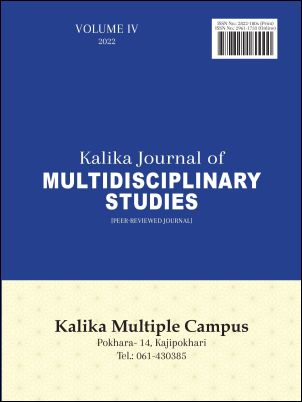Medicinal Value of Cassia Fistula Linn: A Comprehensive Review
DOI:
https://doi.org/10.3126/kjms.v4i1.51600Keywords:
Cassia, fistula, linn, pharmacological, rajbriksha, traditional medicineAbstract
Nepal is the rich source of NTFPs species which are well known for its medicinal properties. The aim of this review is to collect the information of Cassia Fistula Linn and explore its medicinal importance. Only secondary data were used to finalize this paper. The result shows that among the medicinal plants, Cassia fistula Linn is also one of the crucial NTFP plant holding valuable medicinal properties. Cassia fistula Linn is commonly known as Rajbriksha and Bandar ko lathi in Nepali. It is also known as a yellow shower tree due to its beautiful and attractive yellow flowers. All parts such as seeds, flowers, bark, leaves, fruits, roots of this tree possess great importance of medicine. It is considered as one of the important valuable medicinal tree. In traditional medicine, this tree is used to cure various diseases such as fever, bronchitis, leprosy, dry cough, skin disease, heart problem, constipation, diabetes, malaria, stomach disorder, burning sensation. Rajbriksha possess various pharmacological activities such as anti-inflammatory, anti-diabetic, antiperiodic, anthelmintic, anti-oxidant, anti-fertility activities. It also possess diuretic, febrifuge, tonic, laxative, cooling, purgative properties. The fruit, bark, leaves, seeds, flowers, roots contain numerous chemical constituents like calcium, iron, potassium, manganese, lipeol, tannins, glucosides, sennosides, rhein, fistulin, alkaloids, acetate, flavonoids. This article aims to provide the review on morphology, distribution, chemical constituent, traditional uses of Cassia fistula Linn.
Downloads
Downloads
Published
How to Cite
Issue
Section
License
All rights reserved. No part of this journal may be produced in any form or by any electronic or mechanical means, including infromation storage and retrieval system, without permission in writting from the publisher, except by a reviewer who may quote brief passage in review.




